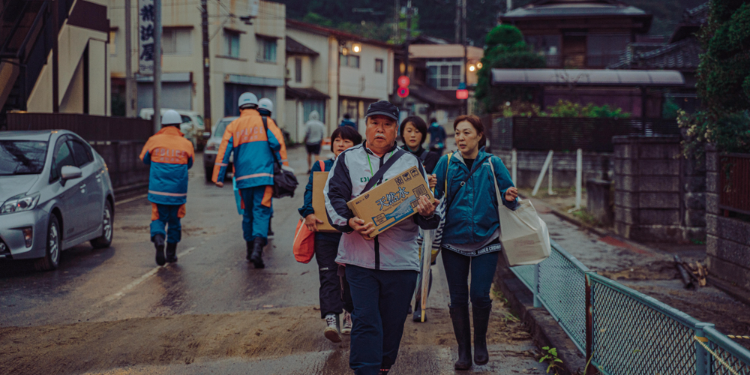
On March 16, at 11:36 p.m. local time, tremors of a magnitude of 7.4 on the Richter scale were recorded in Japan. The epicentre was 60km deep, under the Pacific Ocean, off the province of Fukushima. A tsunami alert was immediately given, bringing back the painful memory of the 2011 events with a death toll of 18,500.
Japan is an archipelago located on the Circum-Pacific Belt, also known as the Ring of Fire. This new earthquake was just another, among many others. Hence, these recurring natural disasters have become part of expats' everyday lives.
Throwback to a restless night
Cédric has lived in Japan for many years, so he's used to natural disasters happening there. “We get thousands of earthquakes of varying intensity (from 4 to 7.3 on the Richter scale) every year throughout the archipelago". But Cedric isn't scared at all since the buildings there are designed to withstand strong earthquakes, so the whole population is used to it. Japan experiences, on average, 20% of the strongest annual earthquakes recorded worldwide.
Testimony of an expat in Chiba, close to Tokyo:
"That night, I came home late and had just cooked dinner for the kids. Shortly after 11:30 p.m., we felt a first small tremor, then a longer one. In general, the longest quakes can last up to 30-40 seconds, but rarely longer. It's classic in Japan, and we followed the usual procedure -- taking refuge under the table, and that's it. But the tremor did not stop as we had expected. After a minute, there was a power cut, and it didn't come back on straight away, which was also unusual". In the end, the tremor lasted about 2 minutes. Once it stopped, they could eat, but there was still no electricity.
All you need during earthquakes in Japan is to have the correct reflexes. At school, children receive training once a month on what to do in case of an earthquake. Regarding infrastructure, everything is done to minimise material damage. For example, objects are hung on walls as much as possible. In stores, appliances are even fixed to the ground.
A tsunami alert that brings back memories
A tsunami alert was given during last March's earthquake. According to expats, even though they are used to dealing with similar situations, the population could not help but remember the tragic events of 2011 in Fukushima. Still, everyone looked prepared for the worse.
Since the earthquake's epicentre was offshore and deep down, the damage was not as significant as expected, with a magnitude of 7.4. But four people died, and hundreds were injured, not to mention the thousands of homes deprived of electricity.
Dany has lived in Tokyo for 8 years. He believes that this is one of the two strongest earthquakes he has felt during his stay. "The walls were shaking, but no objects fell". He recalls that the epicentre was nearly 200 km from Tokyo, so he wasn't so worried.
Fortunately, the tsunami alert was lifted the following day as nothing more serious happened. But it's worth noting that past events transformed the local mentality. After the Kobe earthquake in 1995, which caused 6,400 deaths and 100 billion dollars in damage, Japan completely revamped its strategy relating to earthquakes. Indeed, the country has invested massively in construction, focusing on new engineering techniques and opting for cutting edge solutions in shock absorption.
The foundations were equipped with shock absorbers, springs, cylinders and other rubber beads, and seismic joints to limit movements. Although buildings are moving due to the force of sometimes very strong magnitudes, there are fewer cracks or collapses during the most violent earthquakes. The choice of materials and the shape of the building are also part of the overall study carried out for each new project.
According to Cédric, who is a travel agent, some monuments over 1500 years old are still in good shape despite repeated earthquakes and tremors throughout the country. Although these buildings were designed more than a thousand years ago, recurring earthquakes were taken into account. Hence, Japan is a pioneer in anti-seismic standards and has architectural gems.
Little mention of earthquakes in the media
The local media say very little about minor events like the March earthquake. According to Cédric, the location of the epicentre makes a huge difference. The March 16, 2022, earthquake did not have the same impact as that of Kobe, which had an equivalent strength and an epicentre located just beneath the city. “Here, 4 deaths out of 42 million people is not considered a major disaster, although we are sorry for these losses and the damage".
The local media only recommended saving energy after the earthquake following the power cut in Tokyo. The Japanese television channel NHK set an example by lowering its brightness and cutting off its exterior lights.
This type of responsible and exemplary behaviour, whether from the population or government and other institutions, shows that the country has progressed in development. In a country where thousands of earthquakes are recorded every dear, expats like locals have to adjust and adopt proper reflexes when dealing with such situations.



















